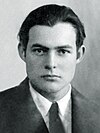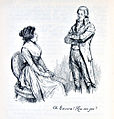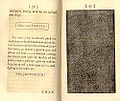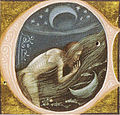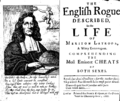The Novels Portal
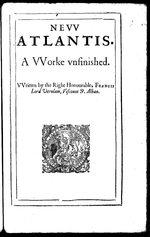
A novel is an extended work of narrative fiction usually written in prose and published as a book. The English word to describe such a work derives from the Italian: novella for "new", "news", or "short story (of something new)", itself from the Latin: novella, a singular noun use of the neuter plural of novellus, diminutive of novus, meaning "new". According to Margaret Doody, the novel has "a continuous and comprehensive history of about two thousand years", with its origins in the Ancient Greek and Roman novel, Medieval Chivalric romance, and in the tradition of the Italian Renaissance novella. The ancient romance form was revived by Romanticism, in the historical romances of Walter Scott and the Gothic novel. Some novelists, including Nathaniel Hawthorne, Herman Melville, Ann Radcliffe, and John Cowper Powys, preferred the term "romance". Such "romances" should not be confused with the genre fiction romance novel, which focuses on romantic love. M. H. Abrams and Walter Scott have argued that a novel is a fiction narrative that displays a realistic depiction of the state of a society, while the romance encompasses any fictitious narrative that emphasizes marvellous or uncommon incidents. Works of fiction that include marvellous or uncommon incidents are also novels, including Mary Shelley's Frankenstein, J. R. R. Tolkien's The Lord of the Rings, and Harper Lee's To Kill a Mockingbird.
The spread of printed books in China led to the appearance of the vernacular classic Chinese novels during the Ming dynasty (1368–1644), and Qing dynasty (1616–1911). An early example from Europe was Hayy ibn Yaqdhan by the Sufi writer Ibn Tufayl in Muslim Spain. Later developments occurred after the invention of the printing press. Miguel de Cervantes, author of Don Quixote (the first part of which was published in 1605), is frequently cited as the first significant European novelist of the modern era. Literary historian Ian Watt, in The Rise of the Novel (1957), argued that the modern novel was born in the early 18th century.
Recent technological developments have led to many novels also being published in non-print media: this includes audio books, web novels, and ebooks. Another non-traditional fiction format can be found in graphic novels. While these comic book versions of works of fiction have their origins in the 19th century, they have only become popular recently. (Full article...)
"Indian Camp" is a short story written by Ernest Hemingway (pictured). The story was first published in 1924 in Ford Madox Ford's literary magazine Transatlantic Review in Paris and republished by Boni & Liveright in 1925 in the American edition of Hemingway's first volume of short stories In Our Time. The first of Hemingway's stories to feature the semi-autobiographical character Nick Adams—a child in this story—"Indian Camp" is told from his point-of-view. In the story, Nick Adams' father, a country doctor, has been summoned to an Indian camp to deliver a baby. At the camp, the father is forced to perform an emergency caesarean section using a jack-knife, with Nick as his assistant. Afterward, the woman's husband is discovered dead, having fatally slit his throat during the operation. The story is important because it shows the emergence of Hemingway's understated style and use of counterpoint. An initiation story, "Indian Camp" includes themes such as childbirth and fear of death, which permeate much of Hemingway's subsequent work. When the story was published, the quality of writing was noted and praised; scholars consider "Indian Camp" an important story in the Hemingway canon.
Selected novel quote

- Religion is a solace to many people and it is even conceivable that some religion, somewhere, really is Ultimate Truth. But in many cases, being religious is merely a form of conceit. The Bible Belt faith in which I was brought up encouraged me to think that I was better than the rest of the world; I was 'saved' and they were 'damned' — we were in a state of grace and the rest of the world were 'heathens' and by 'heathen' they meant such people as our brother Mahmoud. It meant that an ignorant, stupid lout who seldom bathed and planted his corn by the phase of the Moon could claim to know the final answers of the Universe. That entitled him to look down his nose at everybody else. Our hymn book was loaded with such arrogance — mindless, conceited, self-congratulation on how cozy we were with the Almighty and what a high opinion he had of us and us alone, and what hell everybody else was going to catch come Judgment Day.
Did you know...
- ...that the romantic epistles Letters of a Portuguese Nun were from a nun to her lover?
- ...that some elements of the Jules Verne adventure story Two Years' Vacation are to be found in William Golding's Lord of the Flies, written 66 years later?
- ...that the Viagens Interplanetarias series of science fiction stories by L. Sprague de Camp was influenced by Edgar Rice Burroughs' Martian novels?
General images
Subcategories
Featured content
| This is a list of recognized content, updated weekly by JL-Bot (talk · contribs) (typically on Saturdays). There is no need to edit the list yourself. If an article is missing from the list, make sure it is tagged (e.g. {{WikiProject Novels}}) or categorized correctly and wait for the next update. See WP:RECOG for configuration options. |
Featured articles
 Ace Books
Ace Books All God's Children Need Traveling Shoes
All God's Children Need Traveling Shoes A Beautiful Crime
A Beautiful Crime Big Two-Hearted River
Big Two-Hearted River Boenga Roos dari Tjikembang (novel)
Boenga Roos dari Tjikembang (novel) The Bread-Winners
The Bread-Winners Brother Jonathan (novel)
Brother Jonathan (novel) Burger's Daughter
Burger's Daughter Candide
Candide Casino Royale (novel)
Casino Royale (novel) Chitty-Chitty-Bang-Bang
Chitty-Chitty-Bang-Bang A Christmas Carol
A Christmas Carol The Coral Island
The Coral Island Cousin Bette
Cousin Bette The Day Before the Revolution
The Day Before the Revolution Len Deighton
Len Deighton Diamonds Are Forever (novel)
Diamonds Are Forever (novel) The Diary of a Nobody
The Diary of a Nobody Doc Savage (magazine)
Doc Savage (magazine) Dr. No (novel)
Dr. No (novel) Drama dari Krakatau
Drama dari Krakatau Dreamsnake
Dreamsnake Farseer trilogy
Farseer trilogy The Fountainhead
The Fountainhead The Fox and the Hound (novel)
The Fox and the Hound (novel) From Russia, with Love (novel)
From Russia, with Love (novel) The General in His Labyrinth
The General in His Labyrinth Gods' Man
Gods' Man Goldfinger (novel)
Goldfinger (novel) The Good Terrorist
The Good Terrorist The Great Gatsby
The Great Gatsby The Green Child
The Green Child Halo: Contact Harvest
Halo: Contact Harvest The Halo Graphic Novel
The Halo Graphic Novel A Handful of Dust
A Handful of Dust The Hardy Boys
The Hardy Boys The Historian
The Historian Hogwarts Express (Universal Orlando Resort)
Hogwarts Express (Universal Orlando Resort) The Hunger Games (novel)
The Hunger Games (novel) I Know Why the Caged Bird Sings
I Know Why the Caged Bird Sings In Our Time (short story collection)
In Our Time (short story collection) Indian Camp
Indian Camp Irish Thoroughbred
Irish Thoroughbred Jonathan Strange & Mr Norrell
Jonathan Strange & Mr Norrell Lad, A Dog
Lad, A Dog The Left Hand of Darkness
The Left Hand of Darkness Live and Let Die (novel)
Live and Let Die (novel) Logan (novel)
Logan (novel) Louis Lambert (novel)
Louis Lambert (novel) The Man in the Moone
The Man in the Moone Mom & Me & Mom
Mom & Me & Mom The Monster (novella)
The Monster (novella) Moonraker (novel)
Moonraker (novel) Naruto
Naruto Night (memoir)
Night (memoir) On Her Majesty's Secret Service (novel)
On Her Majesty's Secret Service (novel) The Open Boat
The Open Boat The Ordeal of Gilbert Pinfold
The Ordeal of Gilbert Pinfold Paradises Lost
Paradises Lost Pattern Recognition (novel)
Pattern Recognition (novel) La Peau de chagrin
La Peau de chagrin The Penelopiad
The Penelopiad Père Goriot
Père Goriot The Phantom Tollbooth
The Phantom Tollbooth The Portage to San Cristobal of A.H.
The Portage to San Cristobal of A.H. Rachel Dyer
Rachel Dyer Raptor Red
Raptor Red Reception history of Jane Austen
Reception history of Jane Austen The Red Badge of Courage
The Red Badge of Courage J. K. Rowling
J. K. Rowling El Señor Presidente
El Señor Presidente Seventy-Six (novel)
Seventy-Six (novel) A Song Flung Up to Heaven
A Song Flung Up to Heaven Southern Cross (wordless novel)
Southern Cross (wordless novel) The Spy Who Loved Me (novel)
The Spy Who Loved Me (novel) Starship Troopers
Starship Troopers The Sun Also Rises
The Sun Also Rises Tom Swift
Tom Swift The Temple at Thatch
The Temple at Thatch The Time Traveler's Wife
The Time Traveler's Wife To Kill a Mockingbird
To Kill a Mockingbird True at First Light
True at First Light Uncle Tom's Cabin
Uncle Tom's Cabin Vision in White
Vision in White Emma Watson
Emma Watson A Wizard of Earthsea
A Wizard of Earthsea Wordless novel
Wordless novel You Only Live Twice (novel)
You Only Live Twice (novel) Z. Marcas
Z. Marcas
Featured lists
 List of Alien (franchise) characters
List of Alien (franchise) characters Aurealis Award for Best Horror Novel
Aurealis Award for Best Horror Novel Aurealis Award for Best Science Fiction Novel
Aurealis Award for Best Science Fiction Novel Aurealis Award for Best Fantasy Novel
Aurealis Award for Best Fantasy Novel Aurealis Award for Best Young Adult Novel
Aurealis Award for Best Young Adult Novel List of works by John Buchan
List of works by John Buchan List of Charmed novels and short stories
List of Charmed novels and short stories List of works by Leslie Charteris
List of works by Leslie Charteris Winston Churchill as a writer
Winston Churchill as a writer Roald Dahl bibliography
Roald Dahl bibliography Len Deighton bibliography
Len Deighton bibliography Arthur Conan Doyle bibliography
Arthur Conan Doyle bibliography The Flashman Papers
The Flashman Papers List of works by H. Rider Haggard
List of works by H. Rider Haggard List of Harry Potter cast members
List of Harry Potter cast members List of works by Georgette Heyer
List of works by Georgette Heyer List of works by E. W. Hornung
List of works by E. W. Hornung Hugo Award for Best Novel
Hugo Award for Best Novel Hugo Award for Best Novelette
Hugo Award for Best Novelette Hugo Award for Best Novella
Hugo Award for Best Novella Hugo Award for Best Short Story
Hugo Award for Best Short Story List of James Bond novels and short stories
List of James Bond novels and short stories John W. Campbell Memorial Award for Best Science Fiction Novel
John W. Campbell Memorial Award for Best Science Fiction Novel List of works by W. E. Johns
List of works by W. E. Johns List of works by Kwee Tek Hoay
List of works by Kwee Tek Hoay Lambda Literary Award for Speculative Fiction
Lambda Literary Award for Speculative Fiction List of awards and nominations received by J. K. Rowling
List of awards and nominations received by J. K. Rowling List of works by W. Somerset Maugham
List of works by W. Somerset Maugham List of works by H. C. McNeile
List of works by H. C. McNeile Nebula Award for Best Novella
Nebula Award for Best Novella Nebula Award for Best Novel
Nebula Award for Best Novel Newbery Medal
Newbery Medal List of Nobel laureates in Literature
List of Nobel laureates in Literature List of Women's Prize for Fiction winners
List of Women's Prize for Fiction winners George Orwell bibliography
George Orwell bibliography List of works by Sax Rohmer
List of works by Sax Rohmer List of works by Dorothy L. Sayers
List of works by Dorothy L. Sayers Theodore Sturgeon Award
Theodore Sturgeon Award P. G. Wodehouse bibliography
P. G. Wodehouse bibliography World Fantasy Award—Anthology
World Fantasy Award—Anthology World Fantasy Award—Collection
World Fantasy Award—Collection World Fantasy Award—Novella
World Fantasy Award—Novella World Fantasy Award—Novel
World Fantasy Award—Novel World Fantasy Award—Short Fiction
World Fantasy Award—Short Fiction World Fantasy Special Award—Non-professional
World Fantasy Special Award—Non-professional
Featured portals
Featured pictures
 File:Alfons Mucha - 1896 - La Dame aux Camélias - Sarah Bernhardt.jpg
File:Alfons Mucha - 1896 - La Dame aux Camélias - Sarah Bernhardt.jpg File:Archibald Standish Hartrick - Rudyard Kipling - Soldier Tales 18 - The Taking of Lungtungpen 1.jpg
File:Archibald Standish Hartrick - Rudyard Kipling - Soldier Tales 18 - The Taking of Lungtungpen 1.jpg File:Archibald Standish Hartrick - Rudyard Kipling - Soldier Tales 19 - The Taking of Lungtungpen 2.jpg
File:Archibald Standish Hartrick - Rudyard Kipling - Soldier Tales 19 - The Taking of Lungtungpen 2.jpg File:Jules-Joseph Lefebvre, Graziella, The Metropolitan Museum of Art.jpg
File:Jules-Joseph Lefebvre, Graziella, The Metropolitan Museum of Art.jpg File:N. M. Price - Sir Walter Scott - Guy Mannering - At the Kaim of Derncleugh.jpg
File:N. M. Price - Sir Walter Scott - Guy Mannering - At the Kaim of Derncleugh.jpg
Things you can do

|
|
Related portals
WikiProjects
- Main projects
- Arts • Books • Literature • Novels • Entertainment • Visual arts
- Related Projects
- Animation • Anime and manga • Biography • Comics • Film • Fictional characters • Media franchises • Music • Television • Video games
What are WikiProjects?
Associated Wikimedia
The following Wikimedia Foundation sister projects provide more on this subject:
-
Commons
Free media repository -
Wikibooks
Free textbooks and manuals -
Wikidata
Free knowledge base -
Wikinews
Free-content news -
Wikiquote
Collection of quotations -
Wikisource
Free-content library -
Wikiversity
Free learning tools -
Wiktionary
Dictionary and thesaurus
